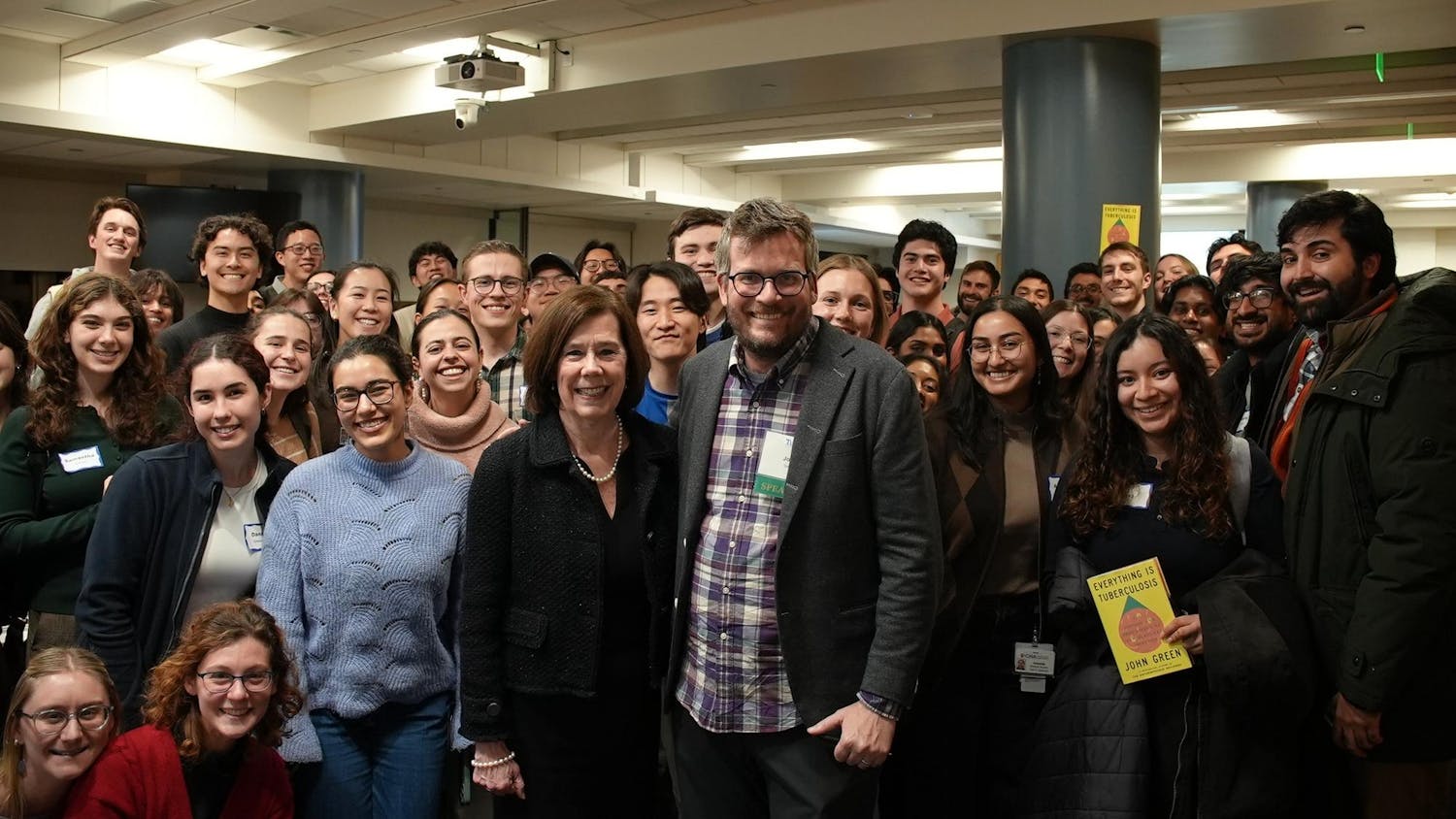This summer, the North Korean regime claimed to have launched a successful intercontinental ballistic missile (ICBM) test, leading intelligence officials to project for a North Korean ICBMs with nuclear capability by 2018, according to a July 27 CBS article. This information has been circulating for the past couple of months, escalating both regional and global fears. Countries and individuals vary in their perception of this conflict, but a common trend holds true: the future cannot be predicted.
Senior Jack Dunkelman, president of Sino-US Relations Group Engagement (SURGE), captured this sentiment well.
“No one really has answers, [although] there are so many different people in the academic field and in literature who have tried to provide answers," Dunkelman said.
Dunkelman commented that, if the U.S. government were to act in response to North Korean nuclear development, such action would have to happen soon due to the 2018 projection.
Michael Beckley, an associate political science professor at Tufts who specializes in East Asia and China, commented that if the current administration were going to launch a preemptive strike, it would have to be done in the next couple of months. He added that, though a preemptive strike by North Korea on the U.S. government is improbable, the United States will likely prevent North Korea from continuing with its nuclear development. He finds it difficult to predict how President Donald Trump will accomplish this.
“I have no idea how to predict what Trump is going to do,” Beckley said. "You can look at [past] examples where he came in hostile to China and caved on a lot of issues. He has a record of talking tough and then negotiating to a more reasonable outcome."
Beckley said that American politicians' criticisms of the North Korean government were moral in nature.
"To them, it is not only a strategic and security issue but also a moral one," Beckley said. "In their eyes, North Korea does not have the moral right to threaten the lives of Americans citizens."
While this fear of North Korea is common within the United States, a similar fear of the United States rings true in North Korea as well, according to junior Edwin Jain and sophomore Henrik Tiemroth. Jain, a member of Tufts Left Unity Project, commented on the fear that the United States instills in other countries.
“To everyone else in the world, the United States is the biggest threat to world peace. They are the only one to have used their nuclear capability,” Jain said.
Tiemroth, treasurer of theTufts Republicans, agreed that the United States poses a threat.
“[The North Korean regime] has been convinced for decades that a United States invasion is imminent, which is reflected in the things they say and the propaganda that they continue to circulate," Tiemroth said. "North Korean actions reflect this fear.”
Sophomore Robert Whitehead, vice president of the Tufts Republicans, echoed this statement, and compared the fear of the United States that Kim Jong-un engenders to the techniques Fidel Castro used to maintain power in Cuba. According to Whitehead, because Castro used the Bay of Pigs invasion and other examples of American aggression to instill the fear of American intervention in Cubans, Cuba's memory of American military intervention remains strong from the Korean War in the 1950s.
Dunkelman spoke of the "axis of evil," a term first used by George W. Bush in his 2002 State of the Union address to characterize the governments of Iran, Iraq and North Korea, which he accused of perpetrating terrorism.
“North Korea really isn’t that paranoid. Especially with the current administration, the U.S. sometimes provokes where it should not provoke,” Dunkelman said.
Hayato Miyajima, an exchange student from Japan, has a similar interpretation of the current U.S. administration. She said that, though Japanese people rely on U.S. perceptions of North Korea to shape their own, the realities in North Korea affect Japan far more than they affect the United Sates. She added that the Japanese public opinion of Trump is quite negative.
“It seems that Trump provokes North Korea," Miyajima said. "[But] Trump can say anything because the United States is much farther from North Korea than Japan."
Senior Minjoon Jung is from South Korea. When discussing potential futures of North Korea, he has seen public opinion shift away from unification between North and South Korea through his lifetime.
“When I was young in elementary school, I learned a song that said ‘our dream is unification, our dream is unification,’ but I am not sure preschool and elementary school students learn this song anymore,” Jung said.
Jung also spoke about the economic and ideological differences that could hinder this unification.
“When I was young, I thought unification was necessary and that it was essential for our country. As time goes by, I now think unification could be dangerous and not advantageous for South Korea because the economy gap is too big," Jung said.
Jung compared the potential unification of Korea to the unification of Germany.
"West Germany was very developed and East Germany was not the poorest country, and North Korea is one of the poorest countries," Jung said. "I do not know if we could cope with this huge gap, and I don't know how we could control the difference in ideology."
Whitehead also brought up the comparison of unification between East and West Germany.
“East Germany came out of the Cold War much more impoverished, and West Germany had to put in a lot of money and resources to catch them up, and they are still lagging behind. If you take that and make it more than twice as bad, the South Koreans would massively have to redevelop the North and do something with these millions of brainwashed anti-cultists,” Whitehead said.
According to Dunkelman, the Chinese government’s role in the North Korean nuclear situation is instrumental. He said that as North Korea's only ally in the world, China has a unique relationship to the nation. He added that Americans often expect China to place checks on North Korea's actions.
“The United States blames China for the North Korean missile program, and China blames the United States. For a lot of Americans under this current presidential administration, it’s always 'if only China could reign in the North Koreans,' they are 90 percent of North Korea’s trade, they are the only ones keeping their economy afloat, et cetera,” Dunkelman said.
It is important, however, to look at North Korean regime survival from the perspective of China. The fall of the North Korean regime could have many negative implications on its neighbor. Dunkelman explained that if North Korea fell, a massive influx of refugees would enter northeast China. Additionally, the expansion of South Korean reign into North Korea would mean that American troops could have a presence in the northern part of Korea.
"With South Korea’s relationship with the United States, the U.S. would be right on the border with China and that is unacceptable,” Dunkelman said. “North Korean regime survival is vital as China continues to develop and modernize."
Due to their economic fragility and isolation, Dunkelman believes that amassing nuclear weapons and developing ICBMs appears to be the best way to ensure the survival of North Korea's regime.
“There was a lot more insecurity around the regime especially with the huge famine in the 1990s and, after the famine, the regime adopted an absolute 'military-first' mindset and poured almost all of their money into their military,” Dunkelman said.
Dunkelman also commented on the huge disparity between gross domestic product, which is quite low, and the amount of money the state spends on military and defense per capita, which is quite high.
Beckley expressed that North Korea will not give up its nuclear weapons, as they are its own protection against the United States, and its only guarantee of survival. He spoke to what could happen if North Korea were able to secure ICBM capabilities.“There is a rank order of their interests [with the military first], and if that means starving the rest of their population, aside from the elites in Pyongyang, then the North Korean regime will do so,” Beckley said.
Beckley said they could also use this potential leverage to nourish their economic situation.
“Social science research suggests that when countries acquire nuclear weapons, countries gain more leverage and bargaining power," Beckley said. "Although nuclear weapons have almost never been used, they still influence bargaining, and in a nightmare scenario where North Korea gets these weapons, they may start upping their demands such as a reduction in the U.S./South Korean relationship and the end to U.S. military exercises."
With so many different parties involved, accelerated technology and little consensus on a plan of action, there is a definite uncertainty on what 2018 will bring among those interviewed. However, what is not for debate in Jung's mind is the human rights violations of the country's government. The regime has been condemned by the UN Human Rights Council, according to a 2017 Human Rights Watch report. Jung spoke of an interaction he had with a North Korean defector which spoke to the horrors that many North Koreans experience.
“When I studied in France, I lived with my cousins, and my uncle went on the airplane from Seoul to Paris and he started a conversation with a North Korean man who told him about his story," Jung said. "My uncle invited him and he stayed at our house for about two days. I could barely have a conversation with him, but he talked about his life with my uncle and his history was a very terrible story. When he tried to escape with his friends, he was the only one to survive. When he left my cousin's house, he gave my aunt an Eiffel Tower key chain that he had meant to give to his friends, but he could not give it to them because they were killed.”






